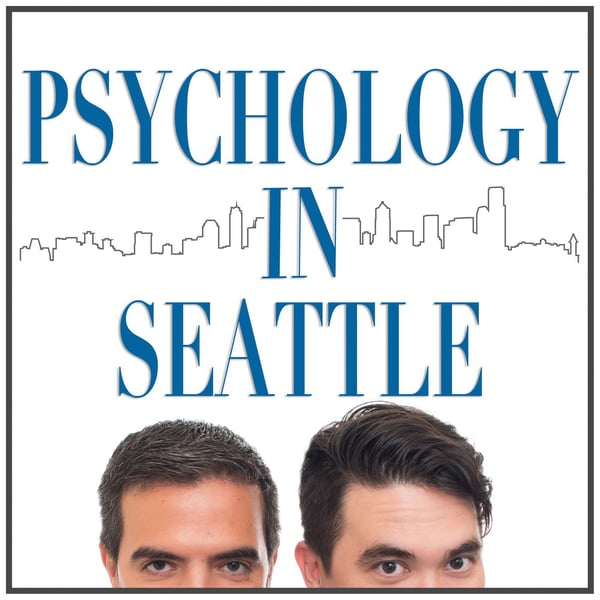Psychedelic Therapy Is Almost Here
Psychology In Seattle Podcast
Kirk Honda
4.6 • 1.2K Ratings
🗓️ 22 March 2023
⏱️ 86 minutes
🧾️ Download transcript
Summary
Dr Nielson’s training programs: https://www.fluencetraining.com
Dr Nielson’s email: [email protected]
From our sponsor, BetterHelp: Need a therapist? Try BetterHelp! https://www.betterhelp.com/kirkGet started today and enjoy 10% off your first month. Discount code “KIRK" will be automatically applied.
00:00 What is psychedelic therapy?
18:13 Are facilitators licensed physicians?
23:34 What do psychedelic therapy sessions look like?
35:34 What might the future of this therapy contain?
54:33 What is the experience like?
March 22, 2023
Become a patron: https://www.patreon.com/PsychologyInSeattle
Email: https://www.psychologyinseattle.com/contact
Merch: https://teespring.com/stores/psychology-in-seattle
Cameo: https://www.cameo.com/kirkhonda
Instagram: https://www.instagram.com/psychologyinseattle/
Facebook Official Page: https://www.facebook.com/PsychologyInSeattle/
TikTok: https://www.tiktok.com/@kirk.honda
The Psychology In Seattle Podcast ®
Trigger Warning: This episode may include topics such as assault, trauma, and discrimination. If necessary, listeners are encouraged to refrain from listening and care for their safety and well-being.
Disclaimer: The content provided is for educational, informational, and entertainment purposes only. Nothing here constitutes personal or professional consultation, therapy, diagnosis, or creates a counselor-client relationship. Topics discussed may generate differing points of view. If you participate (by being a guest, submitting a question, or commenting) you must do so with the knowledge that we cannot control reactions or responses from others, which may not agree with you or feel unfair. Your participation on this site is at your own risk, accepting full responsibility for any liability or harm that may result. Anything you write here may be used for discussion or endorsement of the podcast. Opinions and views expressed by the host and guest hosts are personal views. Although, we take precautions and fact check, they should not be considered facts and the opinions may change. Opinions posted by participants (such as comments) are not those of the hosts. Readers should not rely on any information found here and should perform due diligence before taking any action. For a more extensive description of factors for you to consider, please see www.psychologyinseattle.com
This show is part of the Spreaker Prime Network, if you are interested in advertising on this podcast, contact us at https://www.spreaker.com/show/3269717/advertisement
Transcript
Click on a timestamp to play from that location
| 0:00.0 | Hey, disurven listeners, as a lot of you know, there's a lot of talk online and in our culture |
| 0:05.1 | about psychedelic therapy. And as a way of clearing up some of the myths and clarifying what we know |
| 0:12.9 | about the form of therapy, I thought I'd have an expert come on the podcast, Dr. Elizabeth Nielsen, |
| 0:19.2 | who's a psychologist. Welcome to the podcast. Thank you so much. It's great to be here. |
| 0:23.8 | You've come on the podcast before as a few years ago and we recently re-ran that episode. And I was |
| 0:29.3 | listening back to it. And I thought, wow, what a great episode. I mean, there was so much |
| 0:33.4 | information that you provided. And I was wondering as I was listening what the current landscape is |
| 0:38.5 | if there's any updates. So let's start from the beginning. What is psychedelic therapy exactly? |
| 0:44.4 | Well, that's a great question. It's a great place to start because I think it's a place where |
| 0:48.4 | different people might have different answers. So for me, when I think about psychedelic therapy, |
| 0:52.5 | I think about the combination of the use of a psychedelic in the context of therapy or in the |
| 0:59.5 | context of psychotherapy. And so implied in there is a certain set of intentions to heal some |
| 1:06.8 | sort of mental distress. Some sort of you could say mental health problem if that's really the |
| 1:13.2 | paradigm of the way that you frame things. But there's this therapeutic intention, which is |
| 1:19.6 | different from other sets of intentions that people may have when they use psychedelics. |
| 1:24.0 | And that really frames it, part of what frames it as a therapy. So you might be looking at something |
| 1:29.1 | like, for instance, psilocybin therapy for depression or MDMA assisted therapy for post-traumatic |
| 1:37.6 | stress disorder. And in those, there's always the indication or the reason that someone is taking |
| 1:45.6 | it. And then it's embedded in this therapeutic framework. So you're working with dynamics of the |
| 1:51.6 | mind. You're working with psychological factors. You're working with the subjective experience |
| 1:58.1 | of the psychedelic in that context to help someone move towards change. So it's not entirely |
| 2:04.4 | reliant on just the pharmacological effects. I would say it's a blend or a continuum between |
... |
Please login to see the full transcript.
Disclaimer: The podcast and artwork embedded on this page are from Kirk Honda, and are the property of its owner and not affiliated with or endorsed by Tapesearch.
Generated transcripts are the property of Kirk Honda and are distributed freely under the Fair Use doctrine. Transcripts generated by Tapesearch are not guaranteed to be accurate.
Copyright © Tapesearch 2025.

